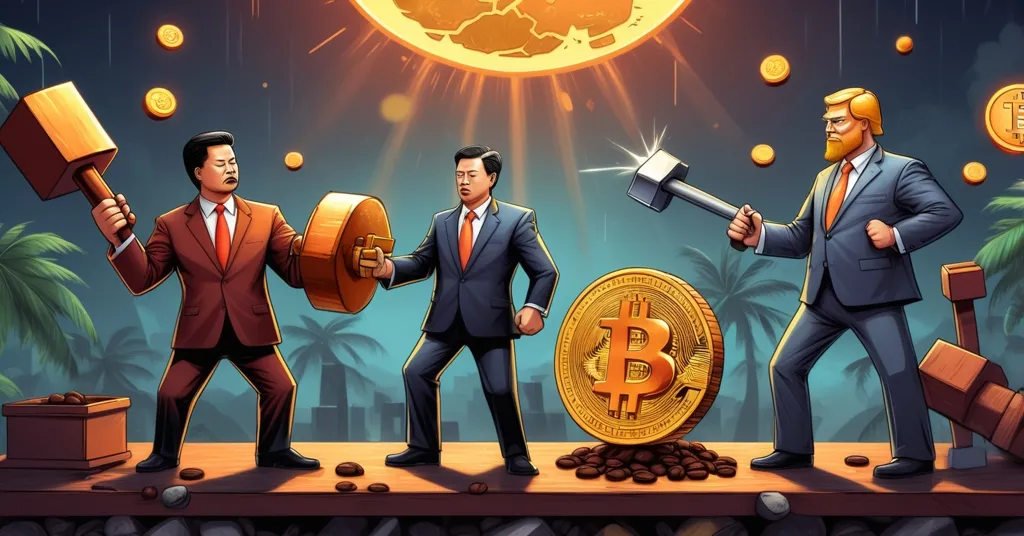Trump Slams Brazil with 50% Tariff: Trade War Sparks Bitcoin and Blockchain Opportunities

Trump’s 50% Tariff on Brazilian Goods: Geopolitical Firestorm with Bitcoin and Blockchain Implications
Donald Trump has unleashed a geopolitical wrecking ball, announcing a staggering 50% tariff on Brazilian goods effective August 1, 2025, over claims of Brazil attacking free speech and fair elections. This aggressive move has already shaken markets, inflamed diplomatic tensions, and hinted at a brewing trade war, while opening a door for decentralized technologies like Bitcoin and blockchain to play a role in mitigating the chaos.
- Tariff Hammer: A 50% tax on Brazilian goods, up from 10%, starts August 1, 2025.
- Core Accusation: Trump slams Brazil for undermining free speech and elections, targeting judicial actions against Jair Bolsonaro and US social media platforms.
- Market and Tech Fallout: Brazil’s economy stumbles, US costs loom, and decentralized solutions beckon.
The Tariff Strike and Trump’s Rationale
With his signature bravado, Trump took to Truth Social to declare war on Brazilian trade, framing the 50% tariff as retaliation for what he calls “sneaky attacks on Free Elections and the basic Free Speech Rights of Americans.” At the heart of his grievance is Brazil’s Supreme Court, led by Justice Alexandre de Moraes, which has issued censorship orders and fines against US social media giants like X for failing to curb misinformation. These actions, often involving account suspensions or content removals, have been painted by Trump as an assault on American values. Layered on top is his staunch defense of former Brazilian President Jair Bolsonaro, a political ally facing charges over an alleged coup plot after losing the 2022 election. Trump’s unwavering support for Bolsonaro, whom he labels a “highly respected leader,” suggests this tariff, as detailed in the announcement of a 50% tariff on Brazilian goods, is as much personal as it is policy-driven.
“Bolsonaro, who was facing charges over an alleged coup plot, was a highly respected leader worldwide during his term. [This is a] Witch Hunt that should end IMMEDIATELY!” – Donald Trump on Truth Social
For those new to this saga, Bolsonaro’s legal troubles are no small matter—he’s barred from public office until 2030 and faces potential sentences totaling 43 years across multiple cases. Trump’s public meddling in another nation’s judiciary has been called unprecedented by analysts, setting a risky precedent for international relations. Meanwhile, the free speech angle ties into a global debate over digital trade and content moderation, with Trump even ordering a Section 301 probe into Brazil’s supposed attacks on American tech companies. This isn’t just about tariffs; it’s a clash of ideologies playing out on a trade battlefield, with deeper insights available in this expert analysis on US-Brazil trade relations and free speech controversies.
Economic Shockwaves: Pain for Brazil and the US
The market response was swift and merciless. Within hours of Trump’s announcement, the Brazilian real depreciated by 2.3%, sliding to R$5.58 against the US dollar, while the Bovespa stock index futures mirrored that drop at 2.3%. This is a gut punch to an economy reliant on exports, signaling distress for Brazilian businesses and citizens alike. But don’t think the US is immune to the fallout. Brazil isn’t a minor player—it’s the third-largest buyer of American coal for steelmaking and a critical supplier of semi-finished steel products. A 50% tariff could inflate costs across US industries already squeezed by tight margins, with potential ramifications explored in this report on the economic impact of Trump’s tariff on Brazil.
Then there’s the consumer sting. Brazil supplies one-third of US imported coffee and half of our orange juice. If this spat escalates, your morning routine could cost more than a Bitcoin transaction fee during a market frenzy. Vice President and Trade Minister Geraldo Alckmin didn’t mince words, warning that these tariffs could backfire by hiking US supply chain costs. Add to that the US’s $7.4 billion trade surplus with Brazil in 2024, per the US Office of the Trade Representative, and Trump’s narrative of an “unsustainable deficit” starts looking like pure fiction. Brazilian President Luiz Inácio Lula da Silva drove the point home, citing decades of favorable trade balances for the US, including a cumulative $410 billion surplus over 15 years. This tariff, they argue, is baseless economic bullying.
“Brazil is a self-governing nation with its own institutions that will not allow anyone to control them.” – Luiz Inácio Lula da Silva
“Brazil is not a problem for the US… there was no justification for higher tariffs on Brazilian goods.” – Geraldo Alckmin
Diplomatic Maelstrom and Ideological Rifts
Brazil’s leadership isn’t backing down. Lula, a leftist who’s never clicked with Trump—hell, they’ve never even met for bilateral talks—defended national sovereignty and dismissed the tariff’s rationale. His administration went further, summoning the acting US ambassador and recalling their own for consultations after labeling Trump’s stance “offensive” and riddled with “false information.” The friction intensified with talk of US sanctions against Justice Moraes for his social media crackdowns, a move that’s only deepened the diplomatic wound, as covered in these updates on Brazil’s Supreme Court censorship orders and US sanctions threats.
This isn’t a standalone jab but part of Trump’s broader trade assault on 22 nations, with tariffs of 25–30% already hitting countries like Algeria, the Philippines, and others, alongside threats of similar hikes for Japan and South Korea. Brazil, as a founding member of the BRICS alliance (a bloc including Brazil, Russia, India, China, and South Africa), faces an additional looming 10% blanket tariff on all BRICS nations for alleged “anti-American policies.” Whether this stacks with the 50% remains murky, but during a recent BRICS summit in Rio de Janeiro, leaders collectively condemned such “indiscriminate rising of tariffs” as a threat to global economic stability. Trump’s wielding trade like a battering ram, and Brazil’s caught in the crosshairs of both policy and personal vendetta—his cozy ties to Bolsonaro, often dubbed “Tropical Trump,” are impossible to ignore.
Historical Echoes: Trade Wars as a Playbook
Trump’s no stranger to this game. His 2018-2019 trade war with China, slapping tariffs as high as 25% on billions in goods, rattled global markets, spiked consumer prices, and only cooled with a tenuous truce. Farmers lost markets, tech firms bled costs, and the pain was mutual. Brazil’s situation feels like déjà vu, but with an uglier twist of ideological grudges. Layered into a strategy targeting multiple nations and blocs like BRICS, this 50% tariff isn’t just protectionism—it’s a geopolitical power play with little regard for collateral damage. History screams caution: trade wars rarely end with clean victories, and both sides tend to limp away bruised. For a broader historical context, check this overview of tariffs under Trump’s administration.
Decentralized Tech: A Lifeline Amid Chaos?
Now let’s zoom in on a perspective that hits our sweet spot. This tariff mess, tangled with free speech battles and currency volatility, raises a critical question: can decentralized technologies like Bitcoin and blockchain offer a way out? Start with the censorship issue. Brazil’s Supreme Court targeting centralized social media platforms exposes their vulnerability to local laws and judicial overreach. Enter blockchain-based alternatives like Nostr, a decentralized protocol for social networking that’s gaining traction in censorship-heavy regions. By design, it resists government control—messages and interactions are spread across a network, not housed on a single server. Could this be a haven for free expression when platforms like X face bans or fines? It’s early days, and user adoption is niche due to clunky interfaces, but the potential is undeniable for sidestepping state meddling, with innovative ideas explored in this piece on blockchain solutions for trade war challenges.
On the financial front, the Brazilian real’s 2.3% tumble spells trouble for citizens watching their purchasing power erode overnight. Bitcoin, often hailed as “digital gold,” isn’t tied to any government or central bank, making it a potential hedge against such volatility. Think of Venezuela in the late 2010s—amid crippling US sanctions and hyperinflation, many turned to Bitcoin to preserve wealth or transact outside collapsing fiat systems. Brazilians could follow suit, using BTC as a store of value while their currency wobbles, a concept further discussed in this analysis of Bitcoin as a hedge in Brazil. Even in the US, if tariffs drive inflation on everyday goods like coffee, more folks might peek at crypto as an alternative. But let’s not drink the Kool-Aid—Bitcoin’s transaction fees can skyrocket during high demand, rendering it impractical for small, urgent trades. Plus, Brazil could easily slap regulatory shackles on crypto if it’s seen as a tariff evasion tool, much like India’s punitive 30% tax on digital assets in 2022.
Then there’s cross-border trade itself. With Brazil’s Economic Reciprocity Law, enacted in April 2025, signaling retaliatory tariffs, traditional finance could choke under added costs and delays. Decentralized finance (DeFi) on platforms like Ethereum offers a workaround—peer-to-peer transactions without banks or middlemen. Stablecoins like DAI, pegged to the US dollar, could let exporters settle deals without wrestling volatile exchange rates or tariff bloat. Global DeFi volume already hit $133 billion in 2022, per Chainalysis, and trade disruptions might turbocharge adoption. Yet, hurdles loom: regulatory crackdowns could kill momentum, and scalability issues mean DeFi isn’t ready for mainstream trade volumes. It’s a tantalizing idea, but no magic fix, with community perspectives shared on Reddit discussions about tariff impacts on economies.
As Bitcoin maximalists, we see BTC’s role as a sovereign store of value shining in crises like this, though we can’t ignore altcoins and protocols like Ethereum filling niches—be it DeFi for trade or stablecoins for stability—that Bitcoin isn’t built to tackle. Decentralization’s promise glitters, but it’s a rough diamond, not a polished solution.
What Lies Ahead: Trade Standoff and Crypto’s Role
Brazil’s not folding. With retaliatory tariffs on the table under their reciprocity law, and Lula vowing to stand firm, this could spiral into a prolonged slog. Past trade wars, like the US-China fiasco, prove these battles bleed both economies—think soybean farmers losing markets or steel costs spiking. For the crypto crowd, watch whether economic strain nudges Bitcoin adoption in Brazil or sparks DeFi innovation for cross-border deals. Don’t expect miracles; this storm’s just revving up, and no blockchain trick will fully shield us if global markets crater. The bigger question lingers: if trade wars push inflation past bearable limits, will decentralized systems see a surge, or will governments smother them with red tape before they can breathe? For more on this angle, explore how tariffs might influence Bitcoin adoption.
Key Questions and Insights on Bitcoin, Blockchain, and Trade Turmoil
- Why did Trump impose a 50% tariff on Brazilian goods?
He’s retaliating over Brazil’s alleged attacks on free speech and elections, pointing to Supreme Court censorship of US social media platforms and the judicial targeting of ally Jair Bolsonaro. - What’s the economic toll on Brazil and the US?
Brazil’s real and stock index dropped 2.3%, signaling market pain, while the US risks higher costs for steel, coffee, and orange juice as supply chains strain under tariff pressure. - Can Bitcoin protect Brazilians from currency volatility?
It’s possible—Bitcoin’s independence from government control makes it a potential haven, as seen in Venezuela’s crisis, though high fees and regulatory risks could limit its reach. - Could blockchain address free speech clashes in this dispute?
Decentralized protocols like Nostr offer censorship-resistant communication, a counter to state-controlled platforms, but adoption and usability challenges persist as barriers. - Will trade wars boost DeFi for cross-border transactions?
Ethereum-based DeFi and stablecoins like DAI could sidestep tariff costs with direct payments, yet regulatory pushback and technical limits might stall widespread use. - Is this tariff purely economic, or driven by deeper motives?
It’s personal—Trump’s loyalty to Bolsonaro and ideological clash with Lula suggest politics and grudges, not just trade imbalances, are fueling this aggressive stance.
Trump’s 50% tariff on Brazilian goods is a geopolitical maelstrom, blending trade policy with raw personal and ideological battles. It lays bare the fragility of global economic ties and how fast they can fray under pressure. For the crypto community, it’s a stark prompt to weigh decentralization’s potential—from Bitcoin as a financial bulwark to blockchain as a bastion of uncensored speech. Yet, let’s cut the rose-tinted nonsense: the road ahead is a brutal slog, and no amount of tech wizardry will spare us if this ignites a full-blown trade inferno. Stay sharp—this clash is far from over.



